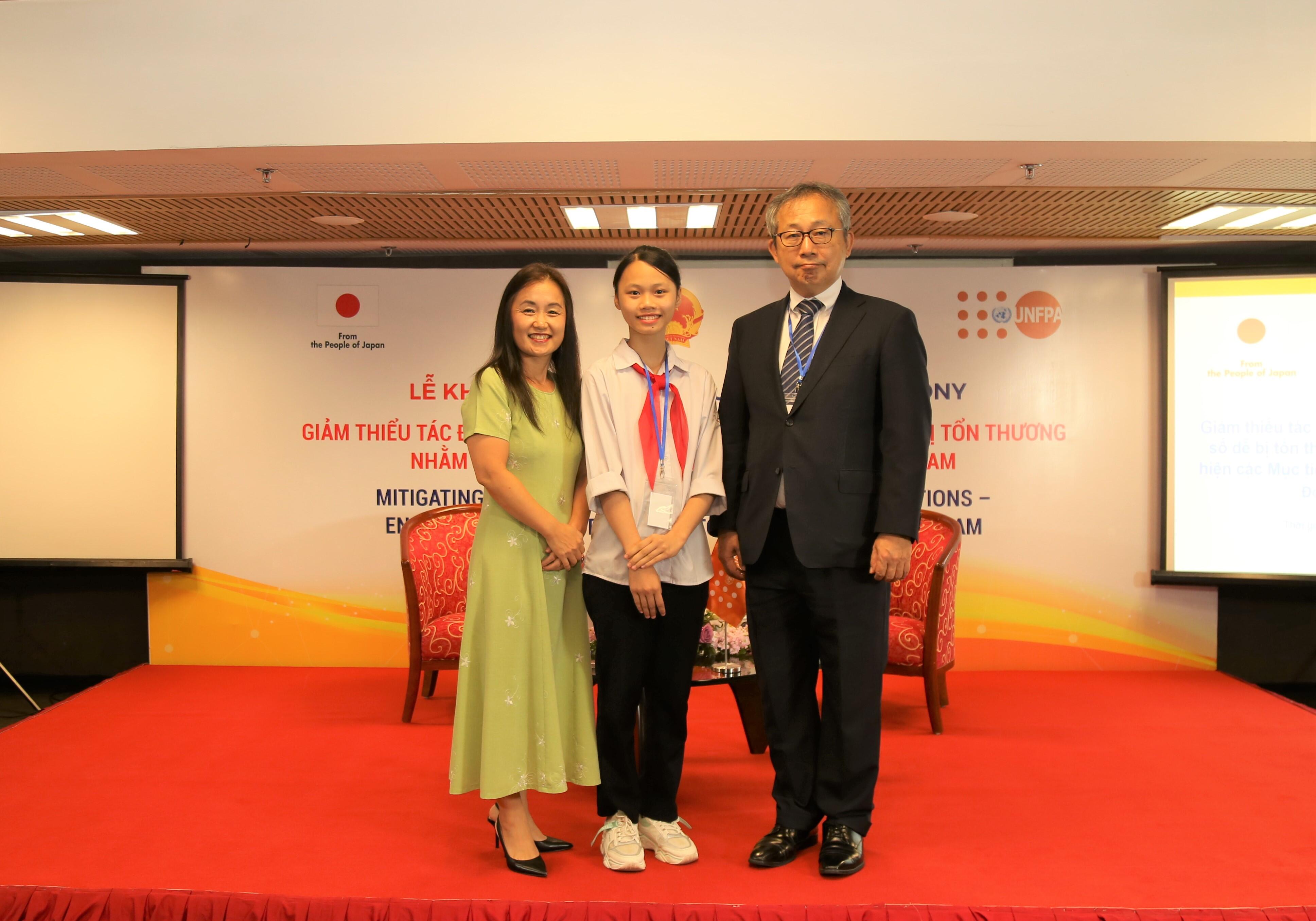HA NOI, 26 April 2021 – Today a new joint project to mitigate the negative impacts of COVID-19 on vulnerable population groups was launched by the Government of Viet Nam, the Government of Japan and the United Nations Population Fund (UNFPA) in Viet Nam. It will be co-implemented by the Ministry of Labour, Invalids and Social Affairs (MOLISA), the Ministry of Culture, Sports and Tourism (MOCST), the Ministry of Health (MOH), the Ministry of Home Affairs (MOHA), the UN agencies, and other relevant stakeholders.
The project will support ongoing efforts by the Vietnamese Government to ensure that the negative impacts of COVID-19 are mitigated for vulnerable and disadvantaged populations, and to ensure the achievement of Sustainable Development Goals (SDGs) in Viet Nam.
Although Viet Nam’s response to COVID-19 has been one of the most effective in the world, the socio-economic consequences of the pandemic are still a matter of great concern. Many people continue to be impacted by the multiple effects of the pandemic and disproportionately affected the most vulnerable and disadvantaged populations, including women and girls, the older persons, and youth.
COVID-19 can stretch and overwhelm the health system, and pregnant women tend to postpone or cancel antenatal care visits and other pregnancy-related appointments due to fear of infection. This can prevent the identification of pregnancy risks and complications, which can lead to unnecessary maternal deaths. According to an estimation conducted by UNFPA in 2020, the maternal mortality ratio could raise by 44-65% as a negative impact of COVID-19 in Viet Nam.
Also, violence against women and girls is one of the most pervasive human rights violations in the world today, and its negative impact on survivors, their families, and communities is immense. A pre-existing prevalence of violence against women and girls has been exacerbated in the context of Covid-19. Recent reports have shown that restrictions in movement, social isolation and similar containment measures, coupled with existing or increased social and economic pressures and stress on families, have led to an increase in violence, particularly against women and girls in the world, and Viet Nam has not been an exception. In many countries it is estimated that such violence has increased by at least 30 per cent.
Moreover, while the virus spreads among persons of all ages, older persons and those with underlying medical conditions are at increased risk of developing severe conditions and having higher death rates from COVID-19. Older persons living in long-term care facilities, such as nursing homes and rehabilitation centers, must be fully protected from infection and adverse outcomes of COVID-19. Older persons who live alone may face barriers to obtaining accurate information, food, medication, and other essential supplies during quarantine conditions and community outreach is required.
Lastly, young people have been disproportionately affected by the COVID‑19 crisis and have been confronted with multiple shocks. Young Vietnamese migrants working abroad have had to deal with the sudden change in employment conditions, and in some cases, had little choice but to return to Viet Nam at short notice where they face a number of social and economic challenges linked to their reintegrated into families, communities and the local labour market.
“The pandemic is showcasing mutual understanding, resource sharing, and above all, solidarity and working-together across communities, societies and countries, in order to cope with this unprecedented challenge. The project we are launching today is a continuation of this beautiful friendship between our two countries, and UNFPA is partnering in this exceptional relationship,”said H.E, Mr. Takio Yamada, Japanese Ambassador to Viet Nam at the launching event.
“The complexity of challenges faced by the people of Viet Nam, particularly the vulnerable groups have grown due to COVID-19. The pandemic is deepening pre-existing inequalities and exposing gaps in social systems. UNFPA strives to ensure that vulnerable population groups receive a comprehensive package of services, a continuum of care, as well as timely referrals.” “In order for Viet Nam to achieve the 2030 Sustainable Development Goals, it is critical to mitigate the negative impacts of COVID-19. It is about making sure that everyone is part of the country’s sustainable development process, leaving no one behind. We trust this new project will make a great leap forward to keeping the SDGs promise in Viet Nam,” said Ms. Naomi Kitahara, UNFPA Representative in Viet Nam at the event.
Japan is providing over USD 2.8 million to support the project, which will be implemented from April 2021 to March in 2022. The project will intervene in four areas as follows:
- Gender Based Violence: enhancing integrated protection services for the survivors of GBV and carrying out GBV prevention work for behavioural change, through strengthening case management and coordination between sectors and raising awareness of the impact and consequences of GBV;
- Quality Care for Older People: ensuring care for older people, particularly those with disabilities, is integrated and continuous during emergency situations and promoting greater private sector involvement in the care of the elderly;
- Sexual and Reproductive Health: ensuring that continuous sexual and reproductive health services are guaranteed to women and young girls in emergency situations, with particular attention to ethnic minorities and those residing in remote and mountainous locations for human security.
- Support to Young Returning Migrant Workers: providing counselling and professional services on SRHR, GBV, job replacement, career planning and income generation for the empowerment of Vietnamese young people.
The project will target 14 provinces/cities across the three regions of Viet Nam:
Northern provinces: Thai Nguyen, Dien Bien, Lao Cai, Thanh Hoa, Nghe An, Ha Tinh
Central provinces: Da Nang, Quang Tri, Quang Nam, and Dak Lak;
Southern provinces: An Giang, Can Tho, Vinh Long, and Ho Chi Minh City.
The event was live streamed on the following links:
Vietnamese: UNFPA Facebook: https://www.facebook.com/unfpa.vietnam/
English: UNFPA YouTube: https://www.youtube.com/channel/UCfQ6WS9vUpeDGhwQ2nEV3aw
-end-
For further information, please contact:
Ms. Nguyen Thi Hong Thanh | UNFPA Communications
Email: tnguyen@unfpa.org | Tel: 0913093363


